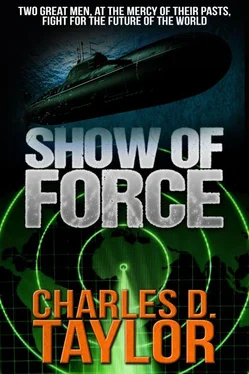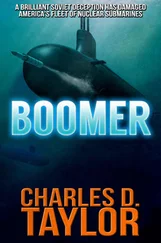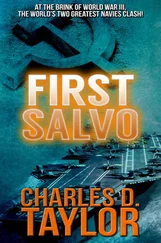The Rigas had dropped down almost to the surface to escape, and David could see them streaking through the formation. They were helpless, no longer armed, and maneuvering wildly to evade attack.
"For Christ's sake, isn't anyone going to fire?" David called out.
Silence for a moment. Then, "I can't yet, Admiral." The voice was Bill Dailey's. "They're still too close to other ships in the formation. They're using them to hide behind. We'll get them when they get out to the perimeter."
"Right… very logical… it's your baby, Bill. Sorry again."
"That's all right, Admiral. But that's not my biggest problem. Look at that." He was pointing at the ASW board. "Those leftover Forgers are going after the helos, trying to free those submarines." He turned to a man behind him speaking quietly into a headset. "Vector some of those Tomcats to help those helos. Goddamn, they're sitting ducks."
"Admiral, request permission to release Valdez to pick up Purer survivors. She's sinking fast."
Without looking up, Charles answered, "Granted. Bill, send some of those frigates out where the helos are going down. Tell 'em to use anything they've got to fill the water with high explosives. They're the ones who are going to be firing at us."
"Yes, sir. Perimeter ships have identified Soviet surface-ship radar. They're getting into range, too."
"We've got longer ranges. We should be attacking now."
"We are, sir. We've already had some hits, but the group commander reports that Russians are using something to explode our warheads before impact."
"Sub-launched missiles in the air!" The report cracked out over the enforced silence sharply. "Nimitz is the target!" As the report was coming in, an American Tomcat jet was diving on one of the firing submarines, from the stern. Before it could escape below the surface, the sail of Virona was hit by two rockets. Fires in the sub's control room had incapacitated its hydraulics and the crew was unable to keep their craft from making a last furious, uncontrolled dive.
The Samson missile, an advanced version of the older Soviet Shaddock, travels at speeds in excess of Mach 2 and carries a warhead containing a thousand pounds of TNT. This was how Kupinsky intended to soften up Nimitz. One of the sub-fired missiles was misdirected to the wrong target and managed to blow off the hanger and flight deck of the destroyer Moosbrugger. The ship's LAMPS helos had just loaded torpedoes and their detonation left her after section in flames.
The two missiles that hit Nimitz created as much damage, but it wasn't as incapacitating for the great ship. One hit near the waterline up forward, blowing a tremendous hole in the hull, but this damage, which would likely have sunk a frigate, barely managed to impede Nimitz' speed. The damage-control parties easily isolated the flooding by sealing off the affected compartments. The second hit aft of the bridge, just below the main deck.
The staff damage-control officer soon reported, "No fires forward. Flooding isolated."
The second blast had been felt in flag plot. It had been much closer. "What about the hit aft," questioned Dailey, but he halted as he saw the man's hand in the air for silence.
He listened for a second. "Missile penetrated hanger deck just below and abaft the island.…" his hand still in the air, listening, "… radar tower hanging over the edge… no aircraft in the area at the time… small fires."
"That's what you call lucky," added Bill Dailey, but the DC officer's hand was still in the air as more damage was reported.
"After starboard elevator is buckled. Damage Control Central reports it inoperative."
"Not so lucky," Admiral Charles added.
"No, sir, but it could have been a hell of a lot worse if we'd been fueling or loading weapons in the area."
"You're right, of course, Bill." He grimaced. "But that's only the beginning, I'm afraid." He gestured at the status board directly in front of them. It was becoming more confused. The forward surface ships had been exchanging missiles since they had been within fifty miles of each other. The first ones were relatively easy to counter. As the ranges drew closer, there was less time to act individually if computer-controlled antimissile systems failed to do their job. The screen was a melange of blinking dots that would occasionally stop on the solid color of a surface ship.
What David Charles was pointing out to Dailey was the acceleration of missiles aimed at Nimitz. She was surrounded by ships whose sole duty was to protect the great carrier from just such an attack. The computer's target-designation system was doing a superb job, not to mention the unseen electronic war silently protecting Nimitz. The first missile from a surface ship to hit the carrier landed on the forward part of the flight deck, penetrating into the chief's quarters. No one was there while the ship was at GQ. The second missile was not to be confused, nor was it ever intended to land on Nimitz. Instead, it settled, rather than fell, in the water less than a mile to starboard.
Nimitz' commanding officer wasn't fooled. Frank Welles was standing on the starboard wing while his OOD conned the ship. The lookout next to him saw it, too. "'For pedo to starboard, Captain."
"I see it," he answered shrilly. "Emergency port," he bellowed into the pilothouse. "Emergency port, aye," came the instant answer.
But the giant ship was never designed to turn as quickly as they all hoped. It takes a long time for ninety-three thousand tons and almost eleven hundred feet of ship to turn, even in an emer gency. A mile at sea is only two thousand yards and a high-speed homing torpedo travels that distance quickly. To Frank Welles it took an eternity for Nimitz to respond and an instant for the torpedo to arrive just forward of the bridge. It would have made little difference anyway, since it was a homing torpedo, set to explode at a depth of fifteen feet. Captain Welles's last impression before impact was the reaction on the lookout's face when he finally realized they would be hit. His eyes were like saucers, his mouth wide in an "O," his binoculars swinging from his neck as he dropped them to look down to the water's surface.
The detonation was felt by the whole ship's crew, and it was as if she had just passed over a reef. Those above it, especially on the bridge, felt their knees buckle. Then a column of water leaped "well above the flight deck. As the geyser reached its maximum height, the noise rolled over them, again shaking the ship. It was the largest warhead the Russians could put on a torpedo and still fire it as a missile. The inward explosion was unlike anything anyone had ever read about, for there had never been one like it before. It had to be a new type of explosive. The hole torn in the side was forty feet across and half as high, completely underwater. The ocean poured in, causing the great ship to veer to starboard. Bulkheads weakened by the explosion fell under the rush of the ocean. There was no fire.
In flag plot, David Charles felt the impact, not knowing where the hit had been taken. Then the power went off, followed by an ominous silence.-Battle lanterns instantly lighted the room and familiar sounds returned. "Engineering spaces…torpedo." He looked at the ship's indicators on the panel to his left. "Bad hit, Bill." He pointed at the panel. "We've already dropped five knots, and we're going all over the goddamn ocean."
In the pilothouse a white-faced sailor at the helm was struggling to get his ship back on course. Captain Welles was standing behind him, hand on the man's shoulder, "Just relax. Tell me what she's doing."
"Pulling to the right, Captain. Whenever she starts to come around, and I let up a bit on the wheel, she starts shuddering and dragging to the right again. I can't hold her, sir."
Читать дальше












